
Uncategorised (33)
News Feed
Firefighters’ Cancer Law – it’s time for action in Victoria
Written by Peter BeatonUPDATE OCTOBER 2016 – WA Parliament passes firefighters’ cancer law for volunteers
WA Passes Firefighters' Cancer Law
The Western Australian Parliament has just passed its Firefighters’ Cancer Law for volunteers, adding to the momentum of presumptive legislation around the country and the pressure for legislation in Victoria.
Tell your MPs it is time for presumptive legislation in Victoria that lists the same 12 cancers named in other States, treats career and volunteer firefighters equally, and includes retrospective coverage for firefighters who have already been diagnosed.
Presumptive legislation works by reversing the onus of proof. The cancer is presumed to be work related provided it is one of 12 listed cancers and the firefighter has sufficient years of service.
The WA legislation was supported by the Liberal National Government, the Labor Opposition, Upper House Greens and independent MPs, however it does not match the standard set by Queensland and South Australia, which treat career and volunteer firefighters equally.
Unlike their career colleagues, WA volunteers are expected to show they have attended at least five hazardous fires – structure and vehicle fires - each year for five years.
Victorian firefighters are still waiting for the legislation they were promised, and there are still unanswered questions.
Before the 2014 State Election, Labor announced that “Victorian legislation for career and volunteer firefighters will reflect the cancers covered and timeframes for duty of service as in the Tasmanian legislation” and explicitly contained no reference to unequal treatment or extra eligibility requirements for volunteers. However, the Government’s letters to volunteers since the election have hinted that it is considering imposing a requirement for an arbitrary number of turnouts before a volunteer becomes eligible for compensation.
Your local MPs need to know that volunteers are tired of waiting and will not accept being treated differently just because they are not paid.
Find your Member of Parliament's contact details here.
Find your Upper House Members of Parliament here.
Notes for Volunteers – 12 October 2015
Firefighters’ Cancer Law – it’s time for action in Victoria
Victorian Government promises legislation, but with a disturbing lack of detail
It is time for action; Queensland has passed legislation for fairer and simpler cancer compensation that treats volunteers and staff equally, while Victorian volunteers have been given promises, but no details and no action.
CFA volunteers have been told the Victorian Government will bring in legislation in 2016, but there are few details and significant unanswered questions;
- Will the legislation be retrospective – if a volunteer is diagnosed with cancer today, will they be protected?
- Will the legislation treat career and volunteer firefighters equally? Queensland and South Australian legislation does, but the older, out of date legislation in Tasmania does not.
Volunteers across Victoria need to show the Government that like Queensland and South Australian volunteers, they won’t accept extra eligibility requirements such as arbitrary turnout thresholds that apply to volunteers but not their career colleagues.
Victoria’s now Deputy Premier and Minister for Emergency Services, James Merlino, said at a volunteer rally on 15 June 2014, ‘there shouldn’t be any reason why we have to wait for presumptive rights legislation here in Victoria’, which leaves volunteers wondering why we are still waiting.
QUEENSLAND AND SOUTH AUSTRALIA HAVE SHOWN HOW IT IS DONE
Queensland passed its presumptive legislation for fairer and simpler cancer compensation for firefighters on 17 September 2015.
The Queensland legislation treats career and volunteer firefighters equally, and names the same 12 cancers and years of service requirements as are listed in the legislation already introduced by the Commonwealth and most States. It is the law that the incoming Victorian Government promised CFA volunteers before the 2014 State Election.
Queensland has followed the other Parliaments in recognising that firefighters are more prone to certain types of cancer, and removing a long standing barrier that blocks sick firefighters from receiving the cancer compensation to which they are entitled.
Queensland’s legislation reverses the onus of proof. The cancer is presumed to be work related, provided it is one of 12 listed cancers and the firefighter has sufficient years of service.
This legislation is not a free ride; the firefighter’s claim can still be rejected if it can be proved that the cancer was not related to firefighting duties.
QLD VOLUNTEERS TREATED FAIRLY DESPITE UFU CAMPAIGN AGAINST THEM
Queensland’s law was passed after a Parliamentary Committee compared the issues, including the Labor Government’s proposal for a discriminatory extra requirement that volunteers show 150 exposure incidents before they qualify for compensation; a relic from the out of date Tasmanian law.
VFBV provided a submission, calling for legislation treating career and volunteer firefighters equally while listing the same 12 cancers and years-of-service requirements used in the Commonwealth and other States’ legislation.
Disappointingly, the United Firefighters’ Union of Australia’s submission to the Queensland Parliamentary Committee called for volunteers to show “a specified minimum of exposure incidents (150)”, but no such requirement for the staff working alongside them.
The UFU submission was surprising given that VFBV and UFU have been pursuing a joint campaign in Victoria since 2012 to ensure all Victorian career and volunteer firefighters are provided with access to their rightful entitlements in the event that they contract cancer.
Queensland’s Parliamentary Committee dropped the discriminatory extra requirement that volunteers show 150 exposure incidents, before the legislation went to a vote.
The Queensland legislation as passed on 17 September 2015. The Chair of the Parliamentary Committee, Labor MP Di Farmer, told the Queensland Parliament, “We were unable to identify any scientific basis for the inclusion of the 150 exposure incidents as being the appropriate measure for exposure by volunteer rural firefighters.”
THE SITUATION IN VICTORIA
Victoria and NSW are the only States left with no legislation to help firefighters with cancer.
Victorian firefighters still face the near impossible barrier that all of the burden of proof is on them. The sick firefighter is expected to come up with the evidence, often more than exists in CFA’s own files, when the cause of their cancer could be a fire or chemical spill 10 or 15 years ago.
Before the 2014 State Election, Victorian Labor announced that “Victorian legislation for career and volunteer firefighters will reflect the cancers covered and timeframes for duty of service as in the Tasmanian legislation” and explicitly contained no reference to unequal treatment or extra eligibility requirements for volunteers.
Since the election, the new Government has promised to introduce legislation in 2016, but has not come up with any details, leaving significant unanswered questions. The Government has told the media it is talking to stakeholders, although VFBV’s most recent letter to the Minister on presumptive legislation remains unanswered.
The State Government is well aware of our concerns over any possible discrimination in the form of extra eligibility requirements that only apply to volunteers, however, the Government’s letters to a number of volunteers since the election have hinted that it is considering imposing a requirement for an arbitrary number of turnouts before a volunteer becomes eligible for compensation.
WHAT VOLUNTEERS CAN DO NOW
Speak up now. Don’t wait until you know a volunteer who has cancer, and don’t wait until the State Government introduces discriminatory or inadequate legislation for Victoria.
- Ask your local Member of Parliament for their support – go and see them, write them a letter or send an email
- Raise the issue with your local media
- Post a comment or a meme on Facebook
- Talk to other volunteers and encourage them to speak up now
Call (03) 9886 1141 or talk to your VFBV State Councillor if you need advice, assistance or your local MP or newspaper’s contact details.
Questions to ask your State MP:
- Do they support presumptive legislation that treats career and volunteer firefighters equally?
- Do they support presumptive legislation that is retrospective, so volunteers are covered if they have cancer now, or are diagnosed before the legislation is passed?
- Will the MP raise the issue in Parliament now and call for an end to the delay?
For CFA volunteers suffering from work related cancer, the promised Victorian legislation can’t come fast enough, and it important that all CFA volunteers send a simple message to Members on both sides of Parliament; we are sick of waiting.
ADDITIONAL INFORMATION
The cancers and years-of-service eligibility requirements that appear in the Commonwealth and other States’ legislation are;
|
Primary site brain cancer (5 years) |
Primary site testicular cancer (10 years) |
|
Primary site bladder cancer (15 years) |
Multiple myeloma (15 years) |
|
Primary site kidney cancer (15 years) |
Primary site prostate cancer (15 years) |
|
Primary non-Hodgkins lymphoma (15 years) |
Primary site ureter cancer (15 years) |
|
Primary leukaemia (5 years) |
Primary site colorectal cancer (15 years) |
|
Primary site breast cancer (10 years) |
Primary site oesophageal cancer (25 years) |
VFBV Volunteer Welfare Fund for the long haul
Written by Peter BeatonFROM THE FIREMAN - NOVEMBER 2010
The VFBV Welfare Fund has had some undeserved bad press in recent weeks – bad press that potentially could have interfered with its important, long term job of helping volunteers in need.
The VFBV Welfare Fund is volunteer-run, reports to the VFBV Board, has its governance and finance reviewed each year by an independent external auditor, and operates according to Australian Taxation Office rules. It provides small cash grants at short notice, to assist CFA volunteers who face significant financial hardship.
The bad press came in the form of a newspaper article that seemed to be based on the incorrect assumption that the Fund had been given a State Government grant of $2 million to be distributed immediately. The article accused VFBV of “sitting on” the money.
The article missed the fact that a different fund, the VFBV Black Saturday Volunteer Recovery Fund, had the role of quickly accumulating donations and distributing assistance to volunteers who had lost their homes, businesses or other significant assets to the Black Saturday Fires. That VFBV-run fund did its job in a matter of months, raising and distributing more than $850,000 to hundreds of volunteers.
The article also missed the fact that the VFBV Welfare Fund is a different type of fund, designed to last indefinitely, and needs to be backed by invested funds to do its job.
VFBV did the groundwork of setting up the Fund, including making representations to the State Government that resulted in a one-off grant of $2 million to be invested so the Fund would have a regular income.
The interest from that investment keeps the Fund’s resources ahead of inflation and provides income that can be paid out as grants to volunteers in need. That healthy investment income has also allowed the Committee of Management to reduce the cost of subscription to just $85 per year for each member brigade.
In its first two calendar years of operation (from October 2008), the VFBV Welfare Fund maintained its capital base, while distributing over $200,000 to assist more than 70 CFA volunteers in need.
The Fund is now in its third financial year, and well on its way to having two thirds of all CFA volunteer brigades subscribe as members.
HOW THE FUND WORKS
The VFBV Welfare Fund enables member brigades to access small welfare grants for CFA volunteers, former volunteer members and their families, who are experiencing significant financial hardship.
Subscribing brigades can apply for a grant by obtaining an application pack, then forwarding the necessary information to the VFBV Welfare Fund’s Committee of Management, which is made up of long-serving CFA volunteers. Decisions are usually made within a few days and any approved grant is forwarded to the brigade.
The process is confidential, and the Committee of Management stays in touch with the brigade in case additional help is needed. The Fund can also organise financial counselling, where required.
Typical recipients include volunteers and their families, or long-serving former volunteers, who face significant financial hardship because of prolonged illness, bereavement, loss of earnings or the travel and accommodation costs associated with supporting a relative in hospital.
The VFBV Welfare Fund offers brigades a quick way to get financial help to a volunteer, which is a benefit to the brigade as well as the volunteer and their family.
It can save a close-knit local brigade the heartache of wanting to help a mate in significant financial hardship, but facing the difficult task of raising two or three thousand dollars in a hurry.
Not one cent of the VFBV Welfare Fund or its income is spent on administration or other VFBV costs. Every cent is dedicated to helping members in need, and thanks to its invested capital base, the Fund will be providing that help to volunteers for generations to come.
HOW TO BE INVOLVED
Donations to the Fund from individuals or organisations are both welcome and tax deductible, and the VFBV Welfare Fund does not pay administration costs – those are met by VFBV.
Any VFBV-affiliated brigade can subscribe to the fund, and the number of member brigades has risen with each year - VFBV expects two thirds of CFA brigades will take up the option to subscribe this year. Affiliation with VFBV costs an average of about $80, depending on the classification of the brigade.
Brigades wishing to subscribe to the Fund or apply for assistance for one of their volunteers can contact the Fund on (03) 9886 1141.
To return to the VFBV website, click here.
Ends…
VESEP Resources: VFBV Helps with Your Application
Written by Peter BeatonThe Volunteer Emergency Services Equipment Program (VESEP) offers grants up to a maximum of $100,000 excluding GST. VESEP contributes $2 for every $1 of funding contributed by the Brigade or Group.
BE READY FOR POSSIBLE FUTURE FUNDING ROUNDS: See below for VFBV's 2016 VESEP APPLICATION HELP PACK and case studies to show you how
About the Program
The million program offers State Government grants of up to $100,000 each, for trucks, equipment and building works. The grants are on a two-for-one basis, giving three dollars in spending power for every one dollar raised by the Brigade and local community.
Eligible volunteer groups include CFA, VICSES, Life Saving Victoria and Australian Volunteer Coast Guard Association (see www.emv.vic.gov.au for other eligible organisations).
VFBV was directly involved in the design of the VESEP program and its later expansion to include small equipment for training and operational use, and the program is now in its 16th year, supporting emergency service volunteers who play a crucial role in responding and assisting their fellow Victorians in times of emergency 24 hours a day, 7 days a week.
The financial support provided by the Government recognises the invaluable support Victorian communities continue to provide to their local agencies.
VFBV support for your Brigade's application
Each year, VFBV provides support to Brigade and Groups in preparing their applications.
At the bottom of this page you will find copies of VFBV’s 2016 Application Help Pack and case studies from past years that include useful tips and advice from Brigades whose applications were successful. We also offer personalised advice for Brigade/Groups that might have questions or are after guidance with their application. Members can contact a VFBV Support Officer or State Councillor to discuss, or email This email address is being protected from spambots. You need JavaScript enabled to view it. and we’ll put in you in touch with someone who can help.
Additional support is available from CFA’s Project Coordinator Diane Frost (This email address is being protected from spambots. You need JavaScript enabled to view it. or 03 9262 8630) or your operations manager. Program details are also available on Brigades Online (Brigade > Property & Equipment > Brigade Owned Vehicles > VESEP).
One important tip is to start early: look at what your Brigade and community will need and start planning for fundraising and the VESEP application. This takes a lot of the pressure off you if a future funding round is announced with just a short window to make applications.
Victorian Members of Parliament who have signed the Pledge
Written by Peter BeatonUpdated 11 March 2016 - Here's a list of Victorian MPs who have signed the pledge to support firefighters with cancer and vote for non-discriminatory presumptive legislation for all Victorian firefighters.
Members of Parliament - If you've signed but are not listed here, or if you would like to sign the pledge, contact VFBV on (03) 9886 1141.
Volunteers - If your local MPs have not yet signed the pledge, see our Presumptive Legislation page to download a copy and see more information on the firefighters' cancer issue.
|
Member (in alphabetical order) |
Electorate |
|
Neil Angus |
Forest Hill |
|
Gary Blackwood |
Narracan |
|
Gippsland East |
|
|
Gembrook |
|
|
South West Coast |
|
|
Hastings |
|
|
Robert Clark |
Box Hill |
|
Peter Crisp |
Mildura |
|
Martin Dixon |
Nepean |
|
Southern Metropolitan |
|
|
Evelyn |
|
|
Bulleen |
|
|
Western Metropolitan |
|
|
Andrew Katos |
South Barwon |
|
Emma Kealy |
Lowan |
|
Northern Victoria |
|
|
Tim McCurdy |
Ovens Valley |
|
Eildon |
|
|
Mornington |
|
|
Morwell |
|
|
Gippsland South |
|
|
Northern Metropolitan |
|
|
Bass |
|
|
John Pesutto |
Hawthorn |
|
Simon Ramsay |
Western Victoria |
|
Dee Ryall |
Ringwood |
|
Steph Ryan |
Euroa |
|
Warrandyte |
|
|
Tim Smith |
Kew |
|
David Southwick |
Caulfield |
|
Ripon |
|
|
Murray Thompson |
Sandringham |
|
Bill Tilley |
Benambra |
|
Heidi Victoria |
Bayswater |
|
Nick Wakeling |
Ferntree Gully |
|
Murray Plains |
|
|
Kim Wells |
Rowville |
|
Mary Wooldridge |
Eastern Metropolitan |
Return to the Presumptive Legislation page
VFBV's Letter to all State MPs - 28 September 2015
Written by Peter BeatonSince the submission date for the Inquiry closed, and following detailed discussion at VFBV State Council in September, VFBV has written to all Victorian Members of Parliament with a summary of our submission to the State Government’s Fire Services Review – see below for a copy of the letter.
The letter includes an introduction to the broader issues and a list of points that volunteers are particularly concerned about.
VFBV has also offered to have volunteer representatives meet with any MPs who would like to discuss the issues or learn more about volunteers’ concerns at the state level or in their local area.
MPs are invited to call the VFBV office on (03) 9886 1141 if they would like to make contact with their local CFA volunteer delegates.
VFBV'S Letter to all State MPs, dated 28 September 2015
Dear Member
VFBV submission to the State Government’s Fire Services Review
As the association representing CFA volunteers, VFBV has recently made an extensive submission to the Fire Services Review. The VFBV submission and relevant material is available via the VFBV website (visit www.vfbv.com.au) and I encourage you to visit our website to read or download this material, as it explains a number of key matters about which volunteers feel very strongly.
Perceptions about the Review’s focus, process and background context have given rise to significant anxiety amongst Victoria’s volunteers, particularly over a number of principles fundamental to CFA’s future success as a volunteer based organisation.
The key and critical principles that volunteers find essential are the following:
♦ The obligations, duties and aspirations both express and implied in the CFA Volunteer Charter as recognised in the current CFA Act and the maintenance of Section 6 of the Act are fundamental to CFA volunteerism and its success in delivering CFA services to the people of Victoria. Critically, flowing from these and in recognition of the core role volunteers play in Victoria’s emergency management, any decision making that may impact on volunteers at any level of government or its agencies must incorporate volunteers in that process and the effects on volunteer capacity must be a clear, transparent and fair feature of such decision making.
♦ Recognition of the importance that the CFA Board has strong volunteer expertise, knowledge and understanding of CFA volunteerism must continue and the engagement of volunteers through current arrangements for volunteer nomination to and level of representation on the CFA Board as currently provided. These arrangements are central to the engagement and utilisation of volunteer knowledge and experience.
♦ The CFA must have genuine ability and empowerment to govern and manage resource decisions, including internal resource allocation and prioritisation of support to volunteers consistent with its current statutory obligations. This includes the powers of the Chief Officer to determine all operational and related matters free of external interference save from the requirements of the CFA Act as currently set out and the statutory role of the Emergency Management Commissioner.
♦ Active removal of external interference and arrangements (including those affecting CFA, EMV and Government) that impede, or block volunteers from being genuinely involved in decision making on all matters which may impact on them including proposed legislation and the adequacy of resources to enable volunteers to deliver the agreed services.
♦ The CFA Budget and priorities must be established at a level and grow as required with such spending and resource priorities so as to ensure that volunteers maintain and continue to grow their capacity to provide CFA services to the people of urban and rural Victoria and provide Victoria with a high level surge capacity to deal with emergencies across the state. The determination and order of budget priorities consistent with this must be determined without inappropriate external interference or influence, and consistent with its statutory, governance and administrative accountabilities, obligations and requirements.
♦ CFA Budget priorities must ensure that there is sufficient resourcing to provide volunteers with best possible access to necessary training, up to date facilities and equipment including Personal Protective Equipment (PPE), communications and vehicles, legal protection, and appropriate financial compensation for injury, illness and personal loss sustained during service to the people of Victoria.
♦ There must be transparency with regard to the determination, collection and expenditure of the Fire Services Levy (FSL).
♦ The total additional cost of any additional initiatives determined by government and not conforming to the order of CFA determined priorities must be resourced separately by government for the duration of the initiative and must not interfere in any way with CFA meeting its resource priorities for encouraging, maintaining and strengthening the capacity of volunteers to deliver CFA services to Victoria.
♦ CFA high level resourcing priorities must include volunteer support and capacity strengthening, including appropriate expansion of the BASO program, training and skills maintenance including first aid training, leadership development, and provision of EMR services to the public by volunteers, fixing communications problems and cyclic vehicle/appliance replacement.
♦ A culture of respect for volunteers, including ensuring there is no discrimination nor any barriers against volunteers simply because they are not paid. This includes barriers to the roles volunteers perform; access to training for volunteers demonstrating a willingness and capacity for higher level training; or utilisation and acceptance of volunteers’ authority and role in command and control within CFA and the broader emergency services. There should also be a leadership culture of active intolerance to any discrimination against volunteers based on their volunteer status.
♦ Acceptance that appropriately trained and experienced volunteers can carry out duties of any designation within CFA and Victoria’s emergency management sector and proactive effort to engage their active utilisation in such roles.
♦ Active encouragement and facilitation of individual volunteers demonstrating a willingness and capacity for high level training and utilisation in command and control and other CFA roles for training, building experience and sustaining qualifications, including for IMTs and the highest levels in incident control.
♦ Government and CFA’s active public and institutional promotion and demonstrated respect for CFA (and other emergency service) volunteers and the essential role they play in Victoria’s safety including advocacy against public attacks made on volunteers.
In summary, volunteers are particularly concerned about:
- Erosion of CFA’s ability to govern, manage resource decisions and allocate appropriate priority to resourcing/supporting the capacity of volunteers to deliver CFA services
- Erosion of the CFA Chief Officer’s statutory powers and operational decision making ability
- The need to improve consultation with volunteers and/or the representation of volunteer knowledge and expertise at key decision forums in any future arrangements
- Erosion of the obligations, intent and authority of the CFA Volunteer Charter and/or the practical application of the CFA Volunteer Charter
- Any decision making processes at CFA, EMV or Government that impact on volunteers but block volunteers out of the process
- Any cuts to CFA budget relating to volunteer support and volunteer capacity building forced because of the need to pay for externally imposed or new commitments
- Any failure to fully additionally fund externally imposed or new commitments for the life of the commitment
- Ensuring adequate investment in resources for training of volunteers and for volunteer equipment, facilities, personal protection, service related injury/illness compensation etc.
- Any diversion of funding raised through the Fire Service Levy and the Government’s related share to other cost areas
- Continuation of industrial agreements that establish power of veto that overrides legitimate CFA decision making or block CFA progressing volunteer support initiatives, resource allocation and CFA organisational structure
- External direction to CFA Board or management that is not transparent, justifiable and consistent with legislation
- Resourcing priorities and funding allocation decisions that ignore more cost effective and reliably beneficial opportunities to encourage, maintain and strengthen the capacity of volunteers to deliver CFA services (specifically referencing section 6i of the CFA Act)
- Any discrimination in the roles volunteers can perform, training opportunities for volunteers or recognition of volunteers’ skills/expertise simply because they are not paid
- Failure to positively advocate the essential nature, benefits and professional capacity of the CFA volunteer based system.
If decisions are made that are not consistent with these principles and concerns, we fear the consequence will be a legacy of diminished emergency management volunteer capacity for Victoria. Our desire and commitment is to work with you towards a positive atmosphere so that volunteers can focus their energy on continuing to provide dedicated services to the community and prepare for the forthcoming summer.
Volunteers want certainty about the real respect and commitment of all key decision makers across Government and institutions to the service they currently provide day and night, every day of the year.
Volunteers want it known that they are committed to the safety of the communities they serve and will strongly resist changes that they feel are not in the best interests of their community.
I am hopeful that you find the VFBV submission to the Fire Services Review and the points outlined above useful to our continuing endeavour to keep all Victorian MPs well informed about matters of fundamental importance to volunteers.
As always I would be more than happy to discuss these matters with you at your convenience.
Yours Sincerely,
Andrew Ford
Chief Executive Officer
<Click here to return to the Fire Services Review Submission page>
Fire Services Review (FSR) – Messages from VFBV and the Minister
Written by Peter BeatonAttention: CFA Volunteers
The open letter from Minister Jane Garrett (below) was received by VFBV this afternoon for circulation to our volunteer communications networks.
Please assist by forwarding the Ministers open letter to fellow CFA volunteers.
In addition to the Ministers invitation for submissions by members of the public and CFA Brigades, VFBV will make a detailed submission. VFBV District Councils are already in the process of facilitating as much discussion as possible within the timeframe provided by the review.
I encourage your active input to VFBV discussion and/or direct input to the Fire Services Review via details provided in the Minister’s Open Letter (attached). David O’Byrne has advised that submissions can be made on a confidential basis and I encourage volunteers to provide input no matter how brief or detailed.
Andrew Ford
Chief Executive Officer
Volunteer Fire Brigades Victoria
A message from Emergency Services Minister Jane Garrett to Victoria's volunteer firefighters
The work you do as CFA volunteers makes a vital contribution to keeping our state safe.
You have Victoria's enduring thanks for the countless times you have protected lives and property in the face of natural disasters.
As you know, the Andrews Labor Government has commissioned a review into Victoria's firefighting services. This will ensure Victoria maintains its world-class fire services.
Some people think this review is designed to amalgamate the CFA and the MFB.
I'm writing to you to assure you that this is not the case and that this idea is not on the government's agenda.
Victoria’s fire services and their boundaries will remain intact.
The review will focus on major issues facing fire agencies. This includes identifying the support volunteer brigades require to remain viable into the future.
As part of this, the reviewer Mr David O'Byrne is talking to people across our fires services community, including Volunteer Fire Brigades Victoria.
Members of the public, including volunteer brigades can make submissions via the dedicated Fire Services Review webpage: https://myviews.justice.vic.gov.au/fireservicesreview or in writing to the Fire Services Review, Level 30, 121 Exhibition Street, Melbourne, VIC 3000.
Submissions will be taken until the 31st of August as the review is due to be finalised before the beginning of the fire season.
If you have any queries in relation to the review, please contact the review secretariat at This email address is being protected from spambots. You need JavaScript enabled to view it.
The Fire Services Review has attracted a number of stories and comments in the media;
Herald Sun - Tuesday, 11 August 2015 - Volunteer Fireys Fear Divide
The Age, Letters Page - Wednesday, 12 August 2015 - Firing up the CFA
2015 Volunteer Welfare & Efficiency Survey - Open Now
Written by Peter BeatonThe 2015 Volunteer Welfare & Efficiency Surveyis now open until 31 August - to complete the survey now click here.
The Victorian Emergency Service Association (VESA) invites all VICSES volunteers to take part in a volunteer-run survey that will better equip your association to advise VICSES and Government on what’s most important to volunteers.
The survey as designed and road tested with emergency management volunteers, so it gets straight to the point on issues that matter to the people on the front line. The survey includes 33 questions on those issues, and takes 10 to 15 minutes to complete. Each question asks how important the issue is to you, and how well you feel it is being handled by VICSES.
Why a volunteer survey?
This annual survey began with the CFA volunteers’ association, Volunteer Fire Brigades Victoria (VFBV) three years ago, and VFBV is how hosting the VICSES volunteers’ version on behalf of VESA.
The results will be compared year to year, to show trends in how volunteers feel on each of the issues. It is a co-operative process; VFBV and the CFA Board both study the CFA volunteers’ version to highlight aspects of volunteer support that need attention. VESA will put our survey to the same use, providing reliable facts and figures to support the association’s representation of all VICSES volunteers.
Your individual answers will be confidential, but the overall results will go straight to the decision makers.
The survey is designed to identify the factors that volunteers feel have a key impact on their welfare and efficiency, to establish ways of measuring whether things are getting better or worse, and to develop a process that uses these measures to ensure better support for VICSES volunteers and Units.
Open to all VICSES volunteers
This survey is making our representation more effective and making sure every volunteer’s voice has the chance to be heard, whether you and your Unit are actively involved with VESA or not.
Last year’s survey drew more than 1,600 responses.
The survey will give VESA facts and figures we can use in working for the benefit of volunteers, Units and the communities they protect, so we urge all VICSES volunteers to take part.
To complete the survey now, click here.
If you would prefer a paper survey sent by post, contact This email address is being protected from spambots. You need JavaScript enabled to view it. or email the VESA Secretary at This email address is being protected from spambots. You need JavaScript enabled to view it.. The survey will remain open until 31 August 2015.
More...
The survey is now open until 31 August - to take part now, click here.
Volunteer Fire Brigades Victoria (VFBV) invites all CFA volunteers to take part in a volunteer-run survey that will better equip your association to advise the CFA Board and State Government on what’s most important to volunteers.
We designed and road tested the VFBV Volunteer Welfare & Efficiency Survey with volunteers, so it gets straight to the point on issues that matter to the people on the front line. The survey includes 33 questions and takes 10 to 15 minutes to complete. Each question asks how important the issue is to you, and how well you feel it is being handled by CFA.
Why a fourth survey?
This year’s survey results will be compared with the first three years' figures, to show trends in how volunteers feel on each of the issues. It is a co-operative process; VFBV and the CFA Board both studied the first three years' results and will continue to use the survey to highlight aspects of volunteer support that need attention. Your individual answers will be confidential, but the overall results will go straight to the decision makers.
The survey is an important step forward in volunteer representation. VFBV is established under the CFA Act to represent volunteers on all matters that affect their welfare and efficiency, and the VFBV Board commissioned this project to identify the factors that volunteers feel have a key impact on their welfare and efficiency, to establish ways of measuring whether things are getting better or worse, and to develop a process that uses these measures to ensure better support for volunteers and Brigades. By repeating the survey periodically, VFBV can track trends in volunteers’ opinions.
Open to all CFA volunteers
Most Brigades are affiliated with VFBV, its officials are CFA volunteers and VFBV represents volunteers in dealings with CFA, the State Government and Opposition, and official inquiries, on everything from routine equipment and procedures to the future of the emergency services as a whole. This survey is making our representation more effective and making sure every volunteer’s voice has the chance to be heard, whether you and your Brigade are directly involved with VFBV or not.
Last year’s survey drew more than 1,600 responses.
The survey will give VFBV facts and figures we can use in working for the benefit of volunteers, Brigades and the communities they protect, so we urge all CFA volunteers to take part.
To take part in the survey, click here.
 The 2014 VFBV Volunteer Welfare and Efficiency Survey is the third annual survey of Victoria’s CFA volunteers conducted by Volunteer Fire Brigades Victoria.
The 2014 VFBV Volunteer Welfare and Efficiency Survey is the third annual survey of Victoria’s CFA volunteers conducted by Volunteer Fire Brigades Victoria.
Whilst there are areas for improvement, it is pleasing to see a trend of gradual improvement against many of the survey aspects. The survey’s intent and main benefit is in guiding effort and focusing energy on just such improvements.
The survey is a practical starting point for conversation and continuous improvement, and with the cooperation of all involved it continues to fulfil the hopes we had for it when we launched it three years ago.
The survey is run by VFBV, informed by growing numbers of volunteers and being put to work as a productive tool by both VFBV and CFA. This year’s survey results once again confirm some strong trends that are clear pointers to paths for improvement by CFA.
A practical and productive document, this survey would not have been possible without the support of CFA volunteers, and our special thanks go out to the more than 1,600 members who participated in 2014.
To all of the volunteers who read this report, I urge you to take part in the 2015 survey and to encourage other members of your Brigade and Group to do the same. By registering now, you can receive the survey by email or by post when it begins in July, and by doing so, you add your own voice to those of the more than 1,600 CFA volunteers who had their say last year.
Andrew Ford
Chief Executive Officer
Volunteer Fire Brigades Victoria
2014 VFBV Volunteer Survey - Volunteer Satisfaction
Written by Peter Beaton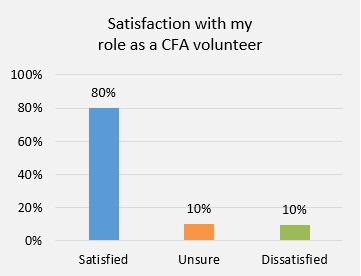
Survey respondents are asked to rate their satisfaction with their role with CFA, the way they are treated by CFA, their intentions to remain a CFA volunteer and their likelihood to recommend being a CFA volunteer to others.
The 2014 survey results across the four satisfaction questions are highly aligned to the 2013 results. 80% of respondents are satisfied with their role in CFA in 2013 and 2014, whilst there is a 2% shift in 2014 from ‘unsure’ to ‘dissatisfied’.
A 2% shift in 2014 from ‘dissatisfied’ to ‘satisfied’ has increased volunteer satisfaction with the way they are treated by CFA from 57% to 59%.
Satisfaction levels with the way volunteers’ rate their treatment by CFA shows the greatest improvement across all satisfaction measures – with a 5% increase in satisfaction from 2012 to 2014.
The ‘intention to continue my role with CFA’ results are identical for 2013 and 2014.
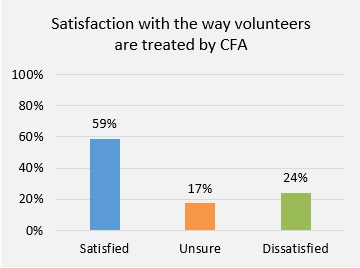
A 1% change in the 2013 and 2014 results for the satisfaction statement ‘I would recommend being a CFA volunteer to people I know’ sees the yes score increase to 81%.
As stated previously, the comparatively low satisfaction score with the way volunteers feel they are treated by CFA suggests that the greatest potential impact on future volunteer welfare and efficiency sits with CFA in the success or otherwise, of their partnerships with volunteer brigades.
In addition to the broader satisfaction questions, survey results against each statement for the past three years can be compiled to observe trends in active satisfaction and active dissatisfaction.
Survey results suggest that whilst volunteers continue to be most satisfied with the support and encouragement they receive at local brigade level, they remain actively dissatisfied with CFA’s performance in relation to consultation at a District, Regional and Corporate level.
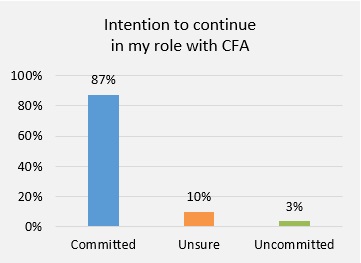
Eleven survey statements scored satisfaction levels markedly higher than the rest of the survey. The same statements have also scored consistently higher for the past three years and in most cases, have shown an improvement in satisfaction levels over that time. These statements relate to the range of factors that contribute to a welcoming and rewarding local brigade environment, that is supportive of volunteers and operating well at a local brigade level.
One statement “volunteers are effectively consulted and involved in decision making at CFA Corporate level” scored dissatisfaction (37%) higher than satisfaction (21%) as well as achieving the lowest satisfaction rating. The same statement scores the second largest gap in survey results and demonstrates an ongoing need for improved consultation between volunteers and Corporate CFA.
Two other statements scored dissatisfaction levels just below satisfaction, consistently over the past three years.
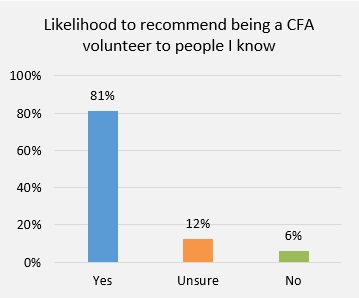
Both statements also relate to CFA policies, practices and workforce arrangements that integrate volunteers and paid staff and the impact these have on volunteer consultation and cooperation.
These results suggest there is an ongoing need for improved effort by CFA to build an effective volunteer-based organisation, in which volunteers are supported by employees in a fully integrated manner.
Given this is a fundamental obligation of CFA as described in the CFA Act, this is an area warranting close attention.
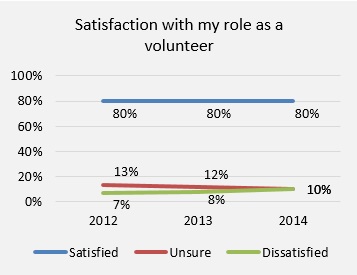
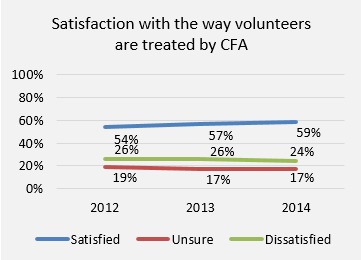
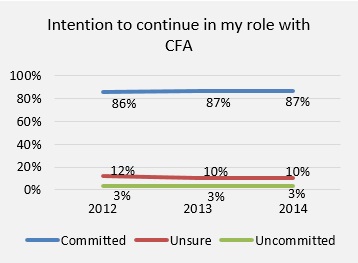
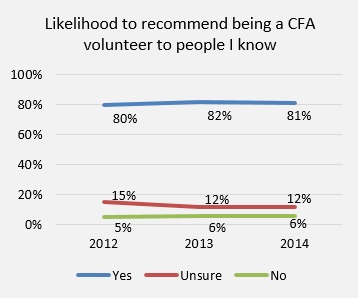
2014 VFBV Volunteer Survey - Demographic Variations
Written by Peter BeatonSurvey respondents provide information that identifies their age, gender, length of time as a volunteer with CFA and brigade type. This information is collated and used to provide material for further analysis.
Gender
In 2014, 86% of survey respondents were male, and 14% female. This is an under representation of the total CFA female volunteer membership, as CFA data indicates that 20% of CFA volunteers are female. The promotion of future surveys to encourage an increased female representation closer to the total membership percentage would benefit the results.
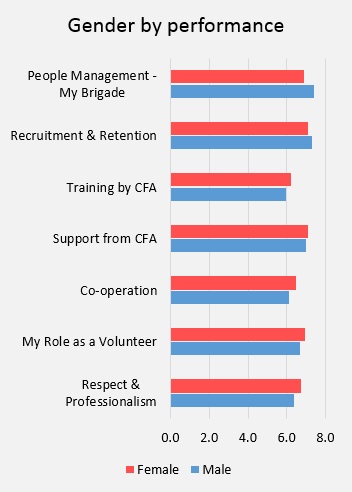

Female survey respondents rated ‘people management – my brigade’ and ‘recruitment and retention’ performance lower than male respondents across the seven themes.
The differences occur when the questions relate to CFA’s performance in conflict resolution, bullying and harassment, in which case, females rate the management of such issues lower than males.
The most telling survey response was in response to the statement “there are no barriers to the roles women can occupy in my brigade”. Females feel that importance and more so performance against this statement are lower than their male counterparts, therefore female respondents see a greater gap.
Nine other survey statements relating to recruitment, retention and brigade behaviour were tested against gender responses; none of the tested statements showed a gender influenced 1.0 gap difference in the above statement. No other statement showed more than 0.5 in gap difference when compared across gender.
More than one third (37%) of survey respondents were in the 40-54 age cohort, which is reflective of the 2010 volunteer participation rate by age as illustrated in the Victorian Auditor General Office 2014 audit Managing Emergency Services Volunteers (p.2).
Survey results broken down by the age range of the volunteer against performance scores show that the overall satisfaction in CFA and brigade is highest in the +65 age group. This may relate to a broader point in life where such views are possibly held on most issues.
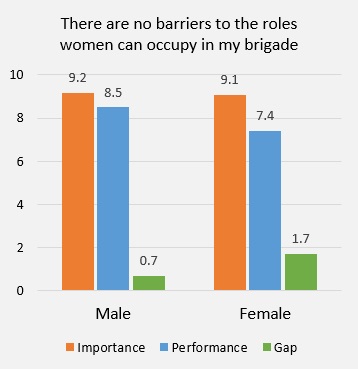
The second highest age range to rank CFA highly is the under 25 year old group, this may relate to length of service and a sense of optimism and future reward within CFA.
Age.
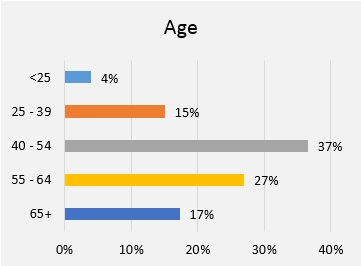
More than one third (37%) of survey respondents were in the 40-54 age cohort, which is reflective of the 2010 volunteer participation rate by age as illustrated in the Victorian Auditor General Office 2014 audit Managing Emergency Services Volunteers
Survey results broken down by the age range of the volunteer against performance scores show that the overall satisfaction in CFA and brigade is highest in the +65 age group. This may relate to a broader point in life where such views are possibly held on most issues.
The second highest age range to rank CFA highly is the under 25 year old group, this may relate to length of service and a sense of optimism and future reward within CFA.
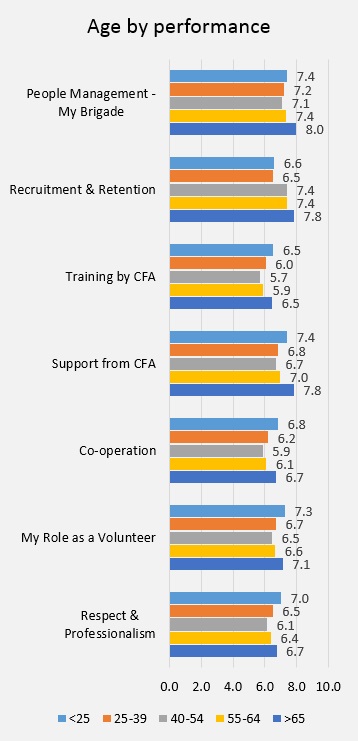
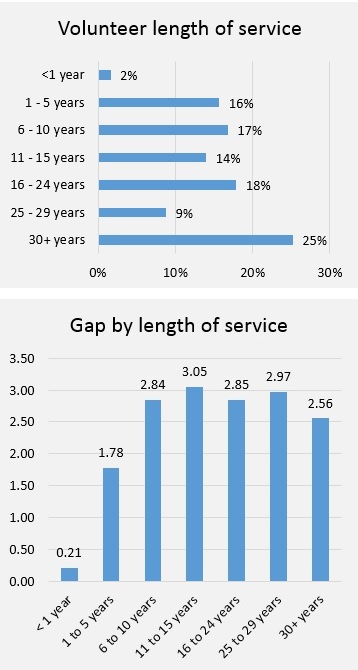
Length of service as a volunteer.
One quarter of survey respondents have spent more than 25 years as a CFA volunteer, the largest length of service group in the survey, whilst 2% had spent less than one year in CFA as a volunteer and 16% less than five years.
Survey results for gap scores were tested against respondents’ age range to see if trends could be identified.
Volunteer length of service created a distinct pattern across the question responses. Volunteers who have served with CFA for less than one year are the most positive about the organisation and their brigade on nearly every question.
Two distinct increases in the gap between importance and performance occur; firstly in respondents with more than one years’ service and then again in volunteers with more than five years’ service. The gap sharply increases after their first year of service, i.e. their level of satisfaction drops sharply after one year and then again after more than five years’ service
Length of service related positivity then begins to reduce the gap back up to the 30+ years’ service mark.
Brigade service/risk environment.
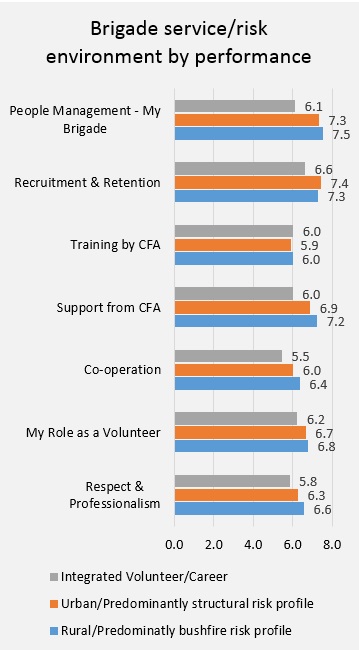
Volunteer membership of four types of brigade service/risk environment could be nominated by the survey respondents, these being;
- Rural/predominantly bushfire risk profile.
- Urban/predominantly structural risk profile.
- Integrated volunteer/career.
- Coast guard brigade.
Only one survey response was received from a coast guard brigade member, therefore this response has little impact on the brigade service environment analysis.
The integrated volunteer/career survey responses consistently scored lower on importance and more so on performance. Integrated brigades scored poorly on performance in relation to workplace bullying, conflict resolution, volunteer consultation, morale and supporting new volunteers. These particular statistical results point to ongoing issues within integrated brigades that require specific attention.
When the nominated brigade service/risk environment responses are tested against performance scores for the survey themes, the results generally show (for five of the seven themes) that brigades with a predominantly rural/bushfire risk rate CFA performance more highly and integrated volunteer/career brigade rate CFA performance the lowest. The only two variations in this trend are where all three brigade service/risk environments rate training performance very closely (6.0, 5.9 and 6.0) and where urban/predominantly structural risk brigades rate recruitment and retention performance higher.
The most marked variation in performance scores between brigade service/risk environments is in the ‘people management – my brigade’ theme where volunteers in integrated volunteer/career brigades rated performance 1.2 below urban/structural risk and 1.4 below rural/bushfire risk types.
The survey performance scores by brigade service/risk environment are reflected in some of the written survey comments, where volunteers feel that the treatment they receive and the relationship they have with career staff are not as good as they should be.
The survey results suggest that further work in understanding the specific issues facing integrated volunteer/career brigades is required in order to improve working relationships between CFA volunteers and CFA career staff.
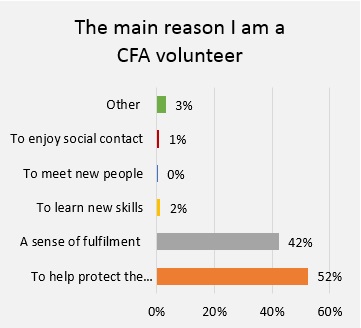
Reason for being a volunteer.
Survey respondents are asked to select their main reason for being a CFA volunteer from six listed options.
Slightly more than half the survey respondents (52%) nominated “to help protect the community I live in” as their main reason, whilst a considerable proportion (42%) nominated “a sense of fulfilment in supporting my community in a meaningful way” as their main reason.
These results are highly aligned to the 2013 survey results, where 50% of respondents nominated “to help protect the community I live in” as their main reason and 44% nominated “a sense of fulfilment in supporting my community in a meaningful way”.
The other four options for both the 2013 and 2014 survey results rated very low by comparison, (4% combined in 2013 and 6% combined in 2014).
When compared to satisfaction levels against the statement “I would recommend being a CFA volunteer to people I know” these results suggest that volunteers play an important part in recruitment, as they are highly motivated by their volunteer experience and keen to see others enjoy the same experience.
Awareness of VFBV.
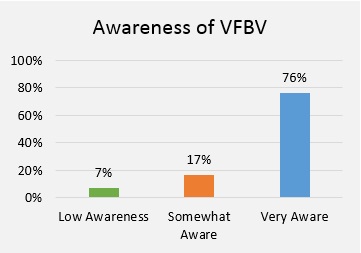
The number of respondents with reasonably high awareness of VFBV had grown from 71% to 76% compared to last year. There are still many volunteers with either low or only moderate awareness of VFBV, so this is an area for continued attention.
The comments received suggest that many volunteers feel a low awareness of VFBV or being aware of the VFBV overall but not feeling a good enough understanding of what VFBV does. Also, how processes work or how they easily access information on particular issues.
Consistent with previous years there is a diverse spectrum of comments regarding whether VFBV should be more forthright in representing volunteers through to some thinking VFBV is too assertive. Comments describing a tension between pursuing a fair go for volunteers and maintaining harmony, particularly regarding issues where CFA workforce culture, arrangements and industrial agreements impact on areas that also directly affect volunteers.
There are also a mix of comments regarding how VFBV should work as a close partner with CFA and Government versus VFBV needing to be more independent and more publically critical of policy and direction that is not good for volunteers.
Comments reinforce the desire of volunteers to have a grass roots connected, well organised, well-resourced volunteer voice but at the same time a strong concern that the funding of such a voice must not erode VFBV’s independence and objectivity.
There are many comments recognising improvements in VFBV engagement and visibility amongst volunteers and also many comments asking VFBV to communicate achievements more broadly and increase the profile of VFBV at brigade level.
A number of comments express a frustration that VFBV is not vocal enough in the public and media debate complaining of the absence of a strong CFA leadership voice. VFBV needs to do more to educate the community about the importance of CFA volunteers and to defend the reputation of volunteers, when it is put down by interest groups with particular agendas.
 About
About 







